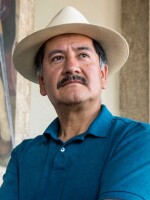Cuban singer Omara Portuondo came to international attention in the 1950s, when that country was less isolated than it has been since the Revolution. Her voice reached ears around the world again in the '90s, when she was featured as the only female singer on the hit Buena Vista Social Club album. Today, Portuondo is 85 — and she's still performing.
Sitting in the restaurant of the classy Capri Hotel in Havana, Portuondo remembers a Cuban composer, Maria Teresa Vera, who was part of the traditional troubadour scene from the 1920s to the '50s. Portuondo has admired Vera's work for a long time. "I've been listening to her songs since I was a little girl," she says — which is why she chose Vera's song, "Veinte Años," for her showcase on Buena Vista Social Club.
Danilo Lozano, a music professor at Whittier College who specializes in Cuban music, says that the 1997 album was Portuondo's re-introduction to international and American audiences. "And that was great," Lozano says, "because what she brought to it was, what can I say ... It was magic."
Portuondo's career began in Havana, in places like the cabaret Salón Rojo and another club across the street from the hotel where we sit. "There at the Club 21, that's where I first started performing with Cuarteto D'Aida," she says. "All of these places are very important to me. They're part of my beginning."
Cuarteto D'Aida was an all-female vocal group directed by pianist Aida Diestro. Portuondo says their gender was not all that made them different from the rest of the Cuban groups of the 1950s.
"It was well-distinguished because director Aida Diestro harmonized us perfectly," she says. "All the great musicians of Cuba admired and respected her for her approach, using notes in such an extraordinary way."
Cuarteto D'Aida became a hit. The group toured the U.S. in the mid-50s, performed with Nat King Cole and recorded an album for RCA Victor.

According to Lozano, the group sang in a style called "Filin." "I would say that the equivalent to what 'Filin' would be like, would be listening to a jazz ballad," Lozano says. "Except that, instead of listening to it instrumentally, you're listening to it vocally, delivered with an instrumental passion — which is unique for Cuban music."
Portuondo became known as "La Novia del Filin," "The Bride of Filin." It was a style of music that embraced both men and women.
Lozano says Portuondo's life spans the history of Cuban music from the 1940s to the present, and that she's championed many Cuban music styles during her time. But her greatest impact came with "Filin" music, where, he says, "she really, really makes a big 'marca-pauta' — she makes a mark in the music. And she becomes known for that, even though she's tremendously versatile."
Portuondo turns 86 at the end of this month during her U.S. tour, and she has no plans to stop working. "Ahora no soy tan niña, pero me siento como una niña," she says, laughing. It means she's not a little girl, but she feels like one.
Copyright 2022 NPR. To see more, visit https://www.npr.org.




